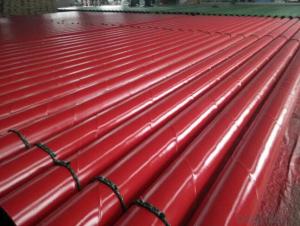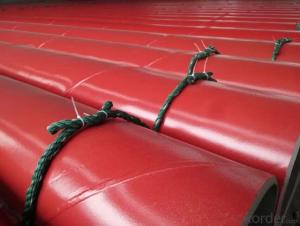seamless and welded 3PE steel pipe external coating
- Loading Port:
- China Main Port
- Payment Terms:
- TT OR LC
- Min Order Qty:
- -
- Supply Capability:
- -
OKorder Service Pledge
OKorder Financial Service
You Might Also Like
Specifications
water pipeline inner-layer tape
1 Butyl rubber as adhesive
2. SGS test report and DVGW certificate
3. corrosion protection
water pipeline inner-layer tape
State-of-the-Art Pipeline Protection for All Climates & Environments
System description:
WATER PIPELINE Inner -layer tape also be called pipe wrap anti-corrosion tape, polyethylene wrap tape.
water pipeline Inner-layer tapeT100 is engineered to assure a high bond to the primed pipe surface with excellent conformability characteristics, aggressive adhesive for corrosion protection and repair of main line coatings.
Inner-layer tapeT100 series is cold applied tape coating system for corrosion protection of Oil, Gas, Petrochemical, and Waste Waterburied pipeline, pipe can be buried, also can be underground ,overhead ,onshore and offshore .
Structure of water pipeline inner wrap tape
The specification of the tape consists of two layers, adhesive layer and film backing
Adhesive: butyl rubber
Film backing: Special blend of stabilized polyethylene
Features & Benefits
Provides a permanent bond to the primed steel pipes surface and provides protection against chemical electrolytic corrosion for underground pipelines.
long term corrosion protection
Worldwide reference lists. Established in-ground history
High chemical resistance under service temperature.
Outstanding electric property and permanent adhesion.
Cold applied, No release liner. Makes installation fast and easy.
Complies with EN-DIN 30672 and AWWAC-214 international standards and also ASTM standards.
Be used for water pipeline corrosion protection
System Properties
Type | T138 | T 150 | T165 | T180 | T 250 | T265 | T280 | |
Thickness | 15mil 0.38mm | 20mil 0.508mm | 25mil 0.635mm | 30mil 0.762mm | 20mil 0.508mm | 25mil 0.635mm | 30mil 0.762mm | |
Backing | 9mil 0.229mm | 9mil 0.241mm | 10mil 0.25mm | 10mil 0.25mm | 15mil 0.38mm | 20mil 0.508mm | 25mil 0635mm | |
Adhesive | 6mil 0.152mm | 11mil 0.279mm | 15mil 0.381mm | 20mil 0.508mm | 5mil 0.127mm | 5mil 0.127mm | 5mil 0.127mm | |
When used for ductile iron pipes inner layer 980-20 or 980-25 and outer layer 955-20 or 955-25 are recommended. | ||||||||
Elongation | ³300% | ³400% | ||||||
Tensile Strength | 55 N/cm | 70 N/cm | ||||||
Color | Black | White | ||||||
Peel Adhesion to Primed Pipe | 33 N/cm | |||||||
Dielectric Strength | 30 KV | |||||||
Dielectric Breakdown | 26 KV/mm | |||||||
Cathodic Disbandment | 0.24 in radius 6.4 mm | |||||||
Water Vapor Transmission Rate | < 0.1% | |||||||
Volume Resistivity | 2.5 x 1015 ohm.cm | |||||||
Impact resistance | 5.5Nm | |||||||
Penetration Resistance | <15% | |||||||
Performance | AWWA C-209,ASTM D 1000,EN 12068 | |||||||
Order information
Length | 100ft(30 M),200ft(60 M),400ft(120 M),800ft(240 M) |
Width | 2’’(50mm),4’’(100mm),6’’(150mm),17’(450mm),32’’(800mm) |
- Q:What are the environmental impacts of steel pipe production and disposal?
- The environmental impacts of steel pipe production and disposal are mainly related to the extraction and processing of raw materials, energy consumption, greenhouse gas emissions, and waste generation. The production of steel pipes requires the extraction of iron ore and other raw materials, which can lead to habitat destruction and biodiversity loss. The processing and manufacturing of steel pipes also involve significant energy consumption, contributing to carbon dioxide emissions and climate change. Additionally, the disposal of steel pipes, especially if not properly managed, can result in waste accumulation and potential soil and water pollution. Therefore, it is crucial to consider sustainable practices and recycling options to minimize the environmental impacts associated with steel pipe production and disposal.
- Q:How are steel pipes protected against mechanical damage?
- Steel pipes are protected against mechanical damage through various methods such as coating them with corrosion-resistant materials, covering them with protective sleeves or wraps, or installing them in underground or enclosed structures to prevent external impact.
- Q:Are steel pipes suitable for use in nuclear power plants?
- Yes, steel pipes are suitable for use in nuclear power plants. They are commonly used for various purposes including cooling systems, steam generation, and containment of radioactive materials due to their high strength, durability, and resistance to corrosion.
- Q:What is the difference between steel pipes and fiberglass-reinforced pipes?
- Steel pipes are made from a durable and strong material known as steel, which provides high strength and resistance to corrosion. On the other hand, fiberglass-reinforced pipes are made from a combination of fiberglass and resin, offering a lightweight and corrosion-resistant alternative. While steel pipes are commonly used for heavy-duty applications such as oil and gas pipelines, fiberglass-reinforced pipes are often preferred for applications that require resistance to chemicals and high temperatures, like in the chemical industry. Additionally, fiberglass-reinforced pipes have the advantage of being non-conductive, making them suitable for certain electrical applications.
- Q:Can steel pipes be used for plumbing?
- Yes, steel pipes can be used for plumbing. Steel pipes are commonly used for plumbing applications due to their strength, durability, and resistance to corrosion. However, other materials such as copper and PVC are also commonly used depending on the specific requirements and preferences of the plumbing system.
- Q:Can steel pipes be used for transporting liquids and gases?
- Indeed, both liquids and gases can be transported using steel pipes. Renowned for their durability, strength, and resistance to corrosion, steel pipes are highly appropriate for various purposes, including the conveyance of fluids and gases. Industries like oil and gas, water supply, sewage systems, and chemical processing plants frequently employ steel pipes due to their reliability and efficiency in transporting liquids and gases across extensive distances. As a result, the transportation of these substances is accomplished securely and efficiently with the aid of steel pipes.
- Q:What kind of argon arc welding wire is used for 16Mn steel pipe?
- JB/T4709 recommends H10MnSi, but H10MnSi allows a lower value of strength of 430MPa, which does not match the parent material. I think American Standard is selected according to the selection of welding wire ER70S-6 GB ER50-6 wire can guarantee the equivalent strength of parent materials, and Si, Mn content can also guarantee the deoxidation effect, the weld joint is not easy to produce pores.
- Q:What is DN50 for welded pipe?
- Commonly used in the market DN50 seamless steel pipe, the outer diameter has two specifications: A, 57mm, B, 60mm, if no special instructions, commonly used is 57mm. The outer diameter of the welded pipe is only 60mm this specification.
- Q:Can steel pipes be used for conveying slurry?
- Yes, steel pipes can be used for conveying slurry. Steel pipes are widely used in various industries for transporting different types of fluids, including slurry. Slurry is a mixture of solid particles suspended in a liquid, and steel pipes are well-suited for handling such mixtures due to their strength, durability, and resistance to corrosion. Steel pipes are also known for their high-pressure and high-temperature capabilities, making them suitable for conveying slurry in demanding applications such as mining, dredging, and wastewater treatment. Additionally, steel pipes can be easily welded, allowing for the construction of long pipelines that can efficiently transport slurry over long distances. However, it is important to consider the specific characteristics of the slurry being conveyed, such as particle size, density, and abrasiveness, to ensure proper pipe selection and design for optimal performance and longevity.
- Q:How are steel pipes used in offshore drilling platforms?
- Steel pipes are used in offshore drilling platforms for various purposes such as transporting drilling fluids, casing and cementing operations, as well as providing support and stability to the platform structure. These pipes are crucial in facilitating the extraction of oil and gas from beneath the seabed by enabling the safe and efficient transfer of fluids and materials during drilling operations.
1. Manufacturer Overview |
|
|---|---|
| Location | |
| Year Established | |
| Annual Output Value | |
| Main Markets | |
| Company Certifications | |
2. Manufacturer Certificates |
|
|---|---|
| a) Certification Name | |
| Range | |
| Reference | |
| Validity Period | |
3. Manufacturer Capability |
|
|---|---|
| a)Trade Capacity | |
| Nearest Port | |
| Export Percentage | |
| No.of Employees in Trade Department | |
| Language Spoken: | |
| b)Factory Information | |
| Factory Size: | |
| No. of Production Lines | |
| Contract Manufacturing | |
| Product Price Range | |
Send your message to us
seamless and welded 3PE steel pipe external coating
- Loading Port:
- China Main Port
- Payment Terms:
- TT OR LC
- Min Order Qty:
- -
- Supply Capability:
- -
OKorder Service Pledge
OKorder Financial Service
Similar products
New products
Hot products
Related keywords




























